Cavalli: Ercole Amante
Introduction
Francesco Cavalli's Ercole Amanti (generally translated as 'Hercules in Love') was the result of a specific commission in 1659 by the chief minister of France, the Italian Cardinal Mazarin. Cavalli was required to compose an opera to celebrate the impending marriage of Louis XIV to Marie-Thérèse of Spain, following a nasty little war between the two countries.
The fact that an Italian composer was asked to do this may have seemed a bit odd, but Cavalli had learned his trade in Venice, where Monteverdi had (almost) single-handedly invented the opera. Also, a chap called Jean-Baptiste Lully was working in France at the time, and being Italian-born himself (becoming a French citizen at around the time of this commission) probably realised that a joint-effort would be good for the King, and the development of French music overall. Lully had the job of writing the ballet music for the opera, and being far more important than Cavalli, took most of the praise once it had all been completed and performed. This wasn't until two years after the royal wedding.
It would be about now that I normally summarise the plot, especially if it's an unfamilar work, but I'm not sure that I can. It's a highly complex plot based on The Trachiniae of Sophocles together with Ovid's Metamorphoses (9th Book), and even the Illustrated Synopsis on the disk takes just over ten minutes to get through the whole work.
Basically, the story revolves around Hercules's attempts to marry someone who isn't his wife. Unfortunately, the woman he has selected is actually being wooed by his son, and she's quite taken by this idea. Hercules doesn't give up though, and gains helps though some divine intervention, which annoys a few other deities, humans and various other, mostly dead, victims of his from the past.
A plot to prevent him from marrying someone else is hatched, however Hercules dies and is transported to heaven so that he may become the bridegroom of the Goddess of Beauty.
Audio and Visual
Cavalli had the good sense to write for reasonably small forces (mostly stings and continuo), and so there are no worries about anything overpowering the music from the stage. When extra instrumentation is unleashed, such as the sparing but impressive use of percussion and trumpets, the DTS handles everything in an exemplary fashion.
The visual quality of this release is astounding. The production is one of the most complicated and colourful I've seen in a long while, and the detail picked up with some great camera direction probably gives the home viewer an advantage over the theatregoer as we can only focus on whatever is shown, rather than be distracted by everything else going on.
Extras
The main extra is a half hour ' making of' that begins at the beginning, when the cast are being introduced to each other, working its way though plenty of rehearsal footage. We learn some fascinating techinal details about building the robotic sea creatures that appear for a short time, and then it all stops suddenly, almost as if you had set up a VHS and the program was running late. Another 30 minutes would have been useful, concentrating on the realisation of the score or the different types of instruments used in the band, but I suppose we can't have everything.
There are also two short 'Behind the Scenes' with Luca Pisarino (Ercole), and Johannette Zomer (Cynthia / Pasithea / Spirit of Clerica) which are decent enough. Zomer began her career working in a laboratory before moving into singing, and Pisarino introduces us to his wife and dog (they all travel around together) and comes across as a very nice chap. The similarity between both chats is the revelation about the shockingly short amount of time they have to learn their roles by heart, while they are also working on other projects. It's amazing how some performers keep their feet on the ground, and perhaps Pisarino got it right when he said he would never have married his wife if she was a singer as well.
The obligatory cast gallery and illustrated synopsis complete the extras on the disc (it's definitely worth watching the synopsis first!), and there is an informative essay on the development of the opera within the booklet.
Conclusion
The original production of Ercole Amante was due to be the first opera performed in a new theatre built within the Tuileries Palace, and it was to have used state of the art stage equipment (the 'Salles des Machines') which could apparently lift 200 people at one go, and switch scenery in record time. It was, of course, incredibly noisy, and anyway, the acoustic of the theatre was appalling. The audience didn't much care for this invasion of fussy Italian music and form, and so made a point of talking all the way through.
Cavalli left France soon afterwards, reportedly so put-out by the reception to his music that he vowed never to write another opera again although after calming down in more friendlier climes he managed to produce six more.
Much like that first performance, the first thing that strikes you about the production on this DVD are the phenomenal staging and costumes. If anything, they are the things which keep your interest up throughout as Cavalli's music itself didn't necessarily grab me as much as perhaps it should have done, despite his sporadic use of surprising percussion interjections and Ivor Bolton conducting as if it were a Mahler symphony. Despite some over the top gesturing he certainly brings a great amount of detail out of the score, and the expert playing from Concerto Köln is a pleasure to hear.
This is why an 'extra' on the music would have come in very handy as it could have shed some light on the perfomers' ideas about where Cavalli stands in the greater scheme of things. There are certainly some lovely moments, mostly towards the end of the work (Act IV Scene 7) when his harmonic language seems to have matured dramatically and the use of more complex double-choruses takes us right back to his Venetian choral training under Monteverdi.
Back to the staging. Here, it almost seems that the team of David Alden (director), Paul Steinberg (set design), Constance Hoffman (costumes), Adam Silverman (lighting) and Jonathan Lunn (choreography) have had so many weird and wonderful ideas, that it was difficult to squeeze everything in, even in such a large work.
Marvellous mechanical creatures and anachronistic ideas abound, and for once, don't get in the way of the viewer's enjoyment. Quite the opposite in fact. The choreography is more 'street' than Baroque, and raises several smiles, and one or two noticeable laughs from the audience. I suspect there must also have been a nod to a certain 'Thriller' routine when the hordes of the dead are raised for their own chorus.
There is a riotous sense of humour in almost everything we see, not least in the costume which Luca Pisaroni has to suffer in the portrayal of Hercules. He is made up to be a mixture between WWE wrestler and stereotypical cartoon superhero, and it's amazing how he can manage any sort of movement, let alone have the stamina to cope with the obvious heat issues in such a covering.
Singing-wise, it's a bit of a mixed bag.
Pisaroni's characterisation of the title role is fantastic, and his voice is strong and mature, yet he doesn't quite manage to carry this power to the lower notes required but there are view baritones around who would be able to last the distance as he does.
Of the rest of the huge ensemble, Anna Bonitatibus (Giunone) and Anna Maria Panzarella (Deianira) impress greatly with powerful and moving performances, and Tim Mead's counter-tenor roles of the Page and the Spirit of Bussiride are the best you will see in a long time.
Jeremy Ovenden (Hyllo) is very believeble as the heartbroken son, and has a big voice, which may not necessarily be suited to this style of music but then again, apart from the orchestral playing, there's little of the 'authentic' in the production overall.
One disappointemt is Marlin Miller's 'Licco'. Much of the vocal writing especially in the upper register seemed to cause some stress, but there can be no argument about the energy Miller puts into the role.
There are so many reasons to watch this production, yet unfortunately the music itself (although the performances are superb) isn't at the top of this list. As a theatrical experience though, it's a winner, and as part of Opus Arte's increasing catalogue, is a fascinating glimpse into the operatic world that was developing between the works of Monteverdi and Rameau, many of which are also reviewed here.
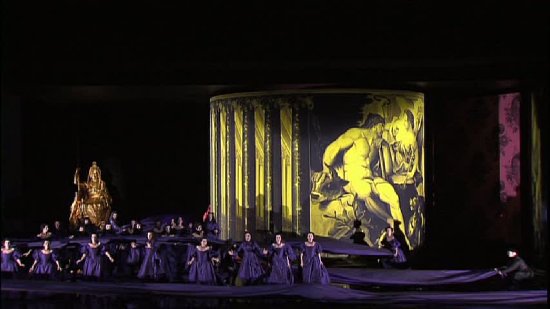
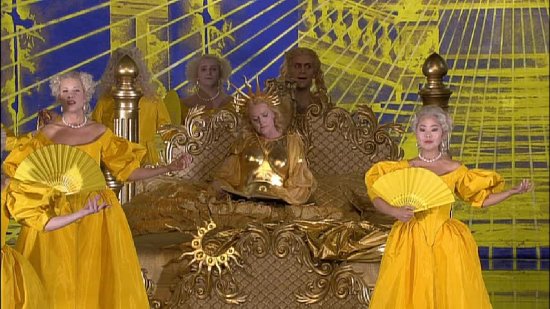
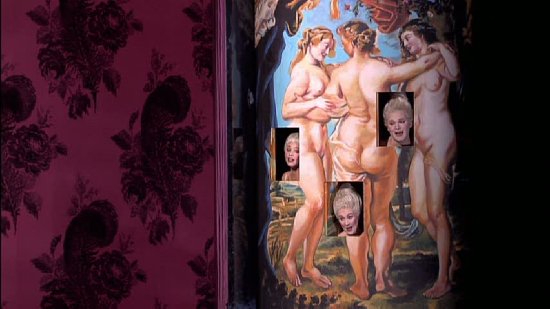
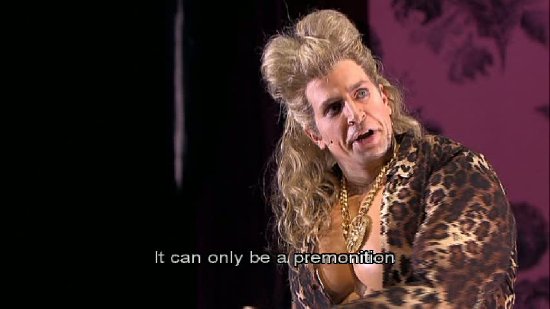
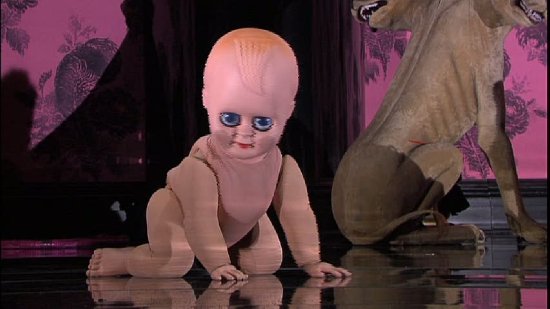
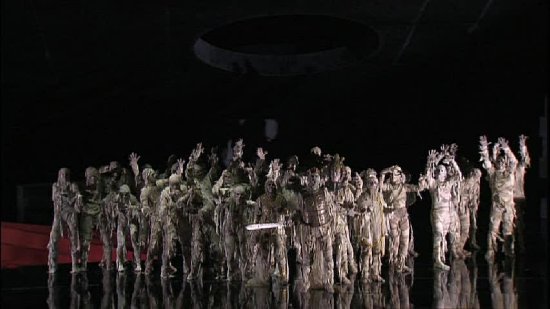
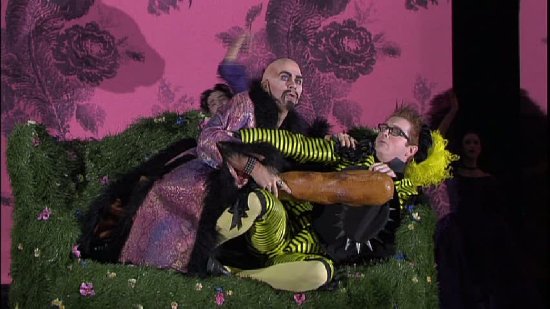
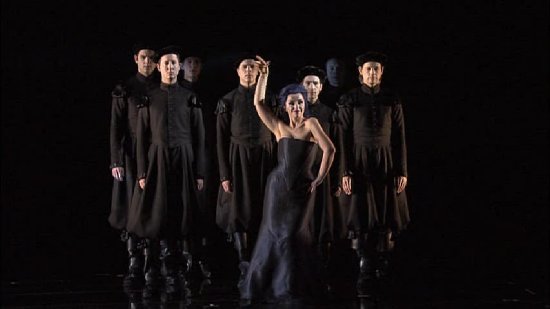
Your Opinions and Comments
Be the first to post a comment!